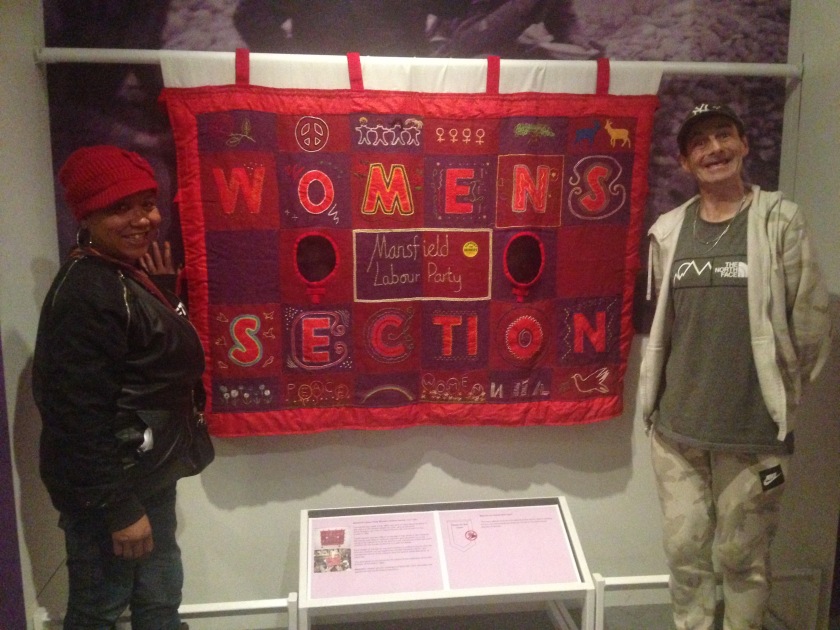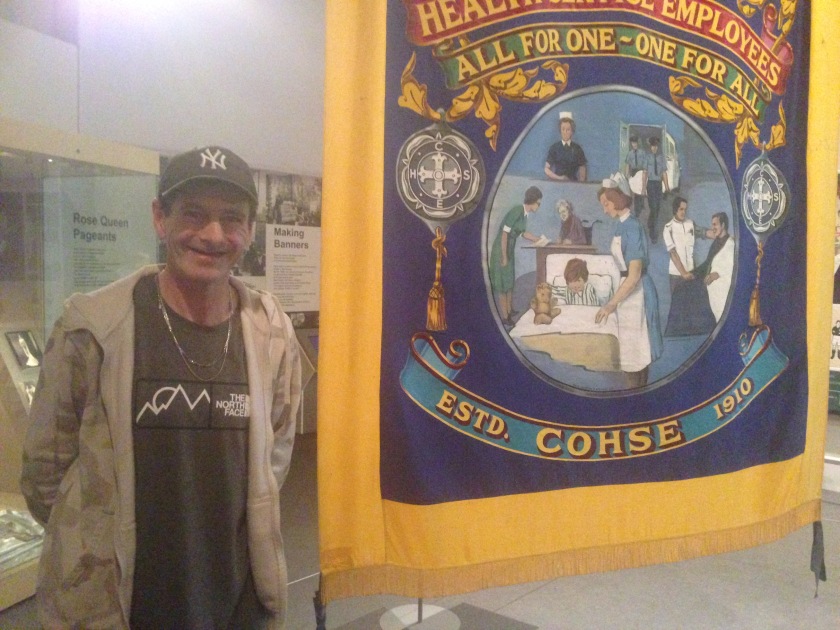I’m still a newcomer to the Booth Centre so during the morning session I got chatting to a few people. The Booth centre attracts a rich variety of people, from Kazakhstan to Collyhurst, all with their own tales to tell. As a songwriter I love to hear people’s stories. We all have our different backgrounds and experiences that make up who we are. So as a first step to writing a song I asked people to think about life stories – their own and other peoples.

Anne Marie and Gary at the People’s History Museum
Gary is from Salford and he wrote from his own life experiences
Salford is a city but has no pity. The people are good but not always understood.
I’ve seen you there but you have no time to spare.
You see the trouble but you don’t understand my struggle.
I’ve seen you there but you have no time to spare.
You see the trouble but you don’t understand my struggle.
I can identify with Gary’s sense of frustration that people only see the surface and don’t understand the struggles going on below. Although we all walk our own paths, it’s important to try and imagine what life is like for other people. To put ourselves in their shoes.

Gary with NHS banner
I asked Joan to pick a person she admired to write about. She picked Shirley Bassey, the singer from Cardiff with the big voice. I asked her to think about what it must be like for Shirley performing and how she might feel when it’s all over. I was really drawn to how Joan saw Shirley on stage, she really has some empathy for her-
When she sings her face is sometimes sad.
Before it lights up as she sings her heart out.
But when she comes off stage she’s emotional
Before it lights up as she sings her heart out.
But when she comes off stage she’s emotional
and feels like crying. We all love her.

Ingus and Anne Marie
In the afternoon a group of14 of us went to visit the People’s History Museum, a place full of stories of people’s lives and struggles. I know the museum well and I’ve written songs about the stories it contains.
I walked round the galleries with Christian, Michal and Jerzy who are from Poland and Ingus who is from Latvia. Although we are from different countries the museum allowed us to find things we had in common.
I walked round the galleries with Christian, Michal and Jerzy who are from Poland and Ingus who is from Latvia. Although we are from different countries the museum allowed us to find things we had in common.
For example the story of the Peterloo Massacre in Manchester in 1819 resonated with events in Poland in the 1970s when the government sent in soldiers to break up demonstrations. An exhibit on post-war rationing bought up discussions about the rationing which was part of daily life in Poland until 1989. When reading about Victorian factory working conditions Christian reflected on a job he had recently when he first came to Manchester. It was also in a factory and during the long shifts staff were filmed and recorded at all times and not allowed to talk to each other.
The museum evoked many different reactions. Some people found it harder to identify with the events of hundreds of years ago but were able to connect better with events post 1945 which are in living memory. When we all regrouped for a cuppa I captured some of the groups initial reactions and thoughts in this graphic.

Peggy felt that todays younger generations don’t value the freedoms they have. And others agreed that people should know more about the struggles of the past. I kept thinking back to the words Gary had written in the morning –
You see the trouble but you don’t understand my struggle.
The People’s History Museum is all about understanding people’s struggles – the fights for representation, for a voice, the fight for equality and better conditions at work. Some of those fights were turbulent, people were arrested, put in prison, executed. Through the museum we can understand the struggles that led people to such desperate measures.
I think the final word belongs to Ingus
“We can understand each other better through sharing our history. When we get to know each other we see we are the same. We’re stronger together.”
No comments:
Post a Comment